
James Heartfield is a British writer and lecturer. He has published widely on international politics and Empire. He wrote The Aborigines' Protection Society, 1837-1909 and An Unpatriotic History of the Second World War. His Ph.D. thesis was published as The European Union and the End of Politics, by ZER0 in 2013.
Mikhail Ivanovich Trepashkin is a Moscow attorney and former Federal Security Service (FSB) colonel who was invited by MP Sergei Kovalev to assist in an independent inquiry of the Russian apartment bombings in September 1999 that followed the Dagestan war and were one of the causes of the Second Chechen War. During his investigation he was arrested by the FSB and convicted to four years of imprisonment for "revealing state secrets".

Alexander Valterovich Litvinenko was a British naturalised Russian defector and former officer of the Russian FSB secret service who specialised in tackling organised crime. According to US diplomats, Litvinenko coined the phrase Mafia state. In November 1998, Litvinenko and several other FSB officers publicly accused their superiors of ordering the assassination of the Russian tycoon and oligarch Boris Berezovsky. Litvinenko was arrested the following March on charges of exceeding the authority of his position. He was acquitted in November 1999 but re-arrested before the charges were again dismissed in 2000. He fled with his family to London and was granted asylum in the United Kingdom, where he worked as a journalist, writer and consultant for the British intelligence services.
Litvinenko is a gender-neutral Slavic surname. It may refer to

Yuri Petrovich Shchekochikhin was a Russian investigative journalist, writer, and liberal lawmaker in the Russian parliament. Shchekochikhin made his name writing about and campaigning against the influence of organized crime and corruption. His last non-fiction book, Slaves of the KGB, was about people who worked as KGB informers.
Igor the Assassin is an SVR and former KGB officer who allegedly killed Alexander Litvinenko and escaped back to Russia. He was among the members of a group consisting of former KGB agents called 'Dignity and Honor'. According to one version of the Alexander Litvinenko poisoning, the official suspect of the murder, Andrei Lugovoi, only distracted the attention of Litvinenko, while "Igor the Assassin" placed the radioactive polonium into the cup of tea served for Litvinenko. "Igor the Assassin" was later seen on his way back to Russia in an airport in London.
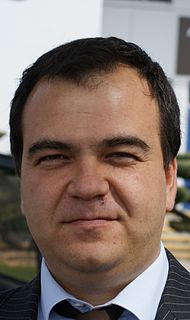
Mario Scaramella is a lawyer, security consultant and academic nuclear expert. He came to international prominence in 2006 in connection with the poisoning of the ex-FSB agent Alexander Litvinenko. As responsible for intelligence analysis and production on KGB and military GRU espionage in Europe, he served as an investigator and adviser to the Mitrokhin Commission. Scaramella was a suspect by the Italian justice department for calumny.

Andrey Konstantinovich Lugovoy, also spelled Lugovoi, is a Russian politician and businessman and deputy of the State Duma, the lower house of the Russian parliament, for the LDPR. He worked as a KGB bodyguard and as head of "Ninth Wave", a security firm. He is wanted by British police on suspicion of the murder of Alexander Litvinenko, a former KGB and later FSB officer. Russia has rejected the request for his extradition.

Paolo Guzzanti is an Italian journalist and politician. He was previously a member of the Italian Socialist Party.
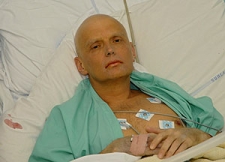
Alexander Litvinenko was a former officer of the Russian Federal Security Service (FSB) and KGB, who fled from court prosecution in Russia and received political asylum in the United Kingdom.
Dmitri Vladimirovich Kovtun is a Russian businessman and ex-KGB agent who met the poisoned ex-spy Alexander Litvinenko several times in London, the last time hours before Litvinenko fell ill. Kovtun was hospitalised with radiation poisoning in Moscow.
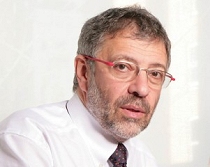
Alexander Davidovich Goldfarb is a Russian-American microbiologist, activist, and author. He emigrated from the USSR in 1975 and studied in Israel and Germany before settling permanently in New York in 1982. Goldfarb is a naturalized American citizen. He has combined a scientific career as a microbiologist with political and public activities focused on civil liberties and human rights in Russia, in the course of which he has been associated with Andrei Sakharov, George Soros, Boris Berezovsky, and Alexander Litvinenko. He has not visited Russia since 2000.
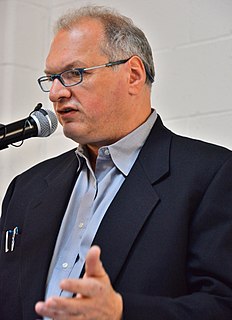
Yuri Georgievich Felshtinsky is a Russian American historian. Felshtinsky has authored a number of books on Russian history, including The Bolsheviks and the Left SRs, Towards a History of Our Isolation, The Failure of the World Revolution, Blowing up Russia, and The Age of Assassins.

Lubyanka Criminal Group is a book by Alexander Litvinenko about the alleged transformation of the Russian Security Services into a criminal and terrorist organization.

Blowing Up Russia: Terror from Within is a book written by Alexander Litvinenko and Yuri Felshtinsky. The authors describe the Russian apartment bombings as a false flag operation that was guided by the Russian Federal Security Service to justify the Second Chechen War and bring Vladimir Putin to power. The story was initially printed by Yuri Shchekochikhin in a special issue of Novaya Gazeta in August 2001 and published as a book in 2002. In Russia the book was prohibited because it divulged state secrets, and it was included in the Federal List of Extremist Materials. However, it was published in more than twenty other countries and translated into twenty languages.
Litvinenko Justice Foundation is a non-profit organization established to demand justice for Alexander Litvinenko who was allegedly poisoned in London, United Kingdom on November 1, 2006.
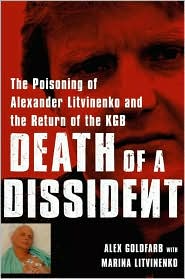
Death of a Dissident: The Poisoning of Alexander Litvinenko and the Return of the KGB is a book written by Alexander Goldfarb and Marina Litvinenko about the life and death of her husband, former FSB officer Alexander Litvinenko who was poisoned by the radioactive element polonium in London in November 2006.
Oleg Litvinenko 23 November 1973 - 19 November 2007) was a Kazakh International footballer from Taraz, who played as a forward.

Rebellion: The Litvinenko Case, distributed as Poisoned by Polonium, is a 2007 Russian documentary film covering the death of ex-Russian spy and dissident, Alexander Litvinenko, who was assassinated in London, United Kingdom in 2006. It was directed by Russian filmmaker Andrei Nekrasov and written by Nekrasov and producer Olga Konskaya.
Tonus Peregrinus is a vocal ensemble specialising in early music and contemporary sacred music, especially that of founder and director, Antony Pitts. TP, as they are also known, has recorded a number of CDs for Naxos, their first winning the Cannes Classical Award, and two albums of Antony Pitts' music for Hyperion Records – Seven Letters and Alpha and Omega. Their latest Naxos album, Music from the Eton Choirbook (8.572840) was recorded using a new microphone technique developed by NRK engineer Geoff Miles.













